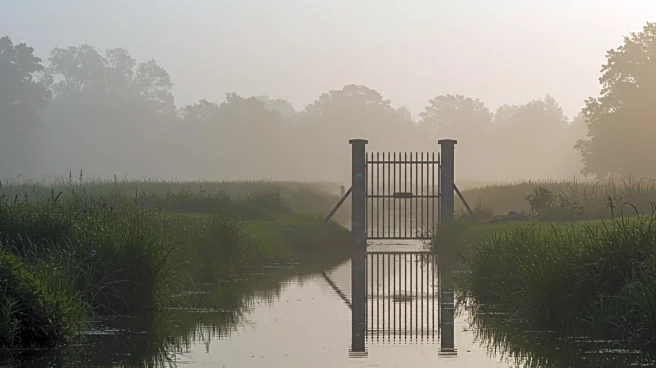What's Happening?
A federal judge has issued a preliminary injunction to halt operations at 'Alligator Alcatraz,' a controversial migrant detention facility in the Florida Everglades. The facility, criticized for its harsh conditions, was constructed rapidly and has been housing detainees in substandard conditions, including extreme heat and inadequate food. The injunction, issued by U.S. District Judge Kathleen Williams, came in response to a lawsuit filed by environmental groups and the Miccosukee Tribe of Indians of Florida. The tribe and environmentalists raised concerns about the facility's impact on the local ecosystem and endangered species. The judge's order prohibits further detainee transfers to the facility and mandates the removal of infrastructure supporting the detention center.
Why It's Important?
The ruling highlights significant environmental and humanitarian issues associated with the facility, which has been a focal point in the broader debate over U.S. immigration policy. The decision underscores the tension between state and federal authorities over immigration enforcement and environmental protection. The facility's closure could impact the Trump administration's immigration strategy, which has faced criticism for its treatment of migrants. The ruling also emphasizes the importance of adhering to environmental laws, as the facility was found to be non-compliant with the National Environmental Policy Act. This case could set a precedent for how similar facilities are evaluated and managed in the future.
What's Next?
The state of Florida plans to appeal the judge's decision, arguing that the injunction disrupts law enforcement and causes financial losses. The outcome of this appeal will determine whether the facility remains closed or resumes operations. Meanwhile, Florida Governor Ron DeSantis has announced plans for a new detention facility, indicating continued efforts to expand immigration detention capabilities in the state. The legal battle is expected to continue, with potential implications for other states considering similar facilities. The case also raises questions about the balance between immigration enforcement and environmental conservation.
Beyond the Headlines
The case brings attention to the broader implications of immigration detention practices on indigenous lands and environmentally sensitive areas. The Miccosukee Tribe's involvement highlights the intersection of indigenous rights and environmental justice. The facility's impact on the Everglades, a critical ecosystem, raises concerns about the long-term environmental consequences of such projects. The ruling may influence future policy decisions regarding the location and operation of detention centers, emphasizing the need for comprehensive environmental assessments before construction.









